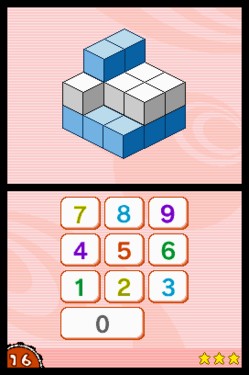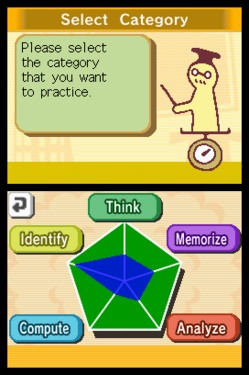Big Brain Academy (Nintendo DS) Review
By Mike Mason  06.07.2006
06.07.2006
The second Brain Training title is Big Brain Academy, the final Touch Generation title to hit Europe for a little while. Nintendo will be hoping that the game will match the chart success of its older cousin, but does it deserve to do well or should it be sent right to the bottom of the class?
Big Brain Academy is otherwise known as Brain Training For Kids in Japan, but don't let this fact cloud your judgement. In fact, ignore it for a moment and don't think you can be complacent when approaching the title - this is not one to take too lightly. While it is aimed at a younger audience than Dr. Kawashima’s Brain Training quite clearly, strip away the presentation and you will find a game that gives a formidable challenge - even more so than Kawashima’s iteration in some ways.
This time, rather than being spoken to by a somewhat disturbing polygonal head, you enrol in an academy to "embiggerate your brain for life" (their words, not ours; we think they may have been a teensy bit influenced by The Simpsons when translating the game, there). The supposedly prestigious school is ran by one Dr. Lobe, a bizarre man that looks a bit like a hand puppet, with no legs to speak of (he hops about and near-permanently resides on a set of scales), who is presumably a lobe from the brain that happens to enjoy wearing a mortar board and likes waving a stick about. Rather than determining the age of your brain, the aim is to discover how much your brain weighs - the heavier the better. This is calculated from the results of a series of mind games that ‘students’ must complete.

The tasks are spread across five different areas: Think, Memorise, Analyse, Compute and Identify. Think includes logic-based questions, such as working out which object is heavier after studying a series of images depicting various objects on scales, while Memorise requires you to, predictably, remember things shown to you (i.e. recalling the order of sounds played to you). Analyse is when players have to use reason to work out the answers (one example being working out how many blocks are in a structure), Compute is the section on maths (such as comparing two sets of coins and tapping the one which is worth most) and Identify asks you to look at visuals on the top screen and match them to elements on the bottom screen (for example, filling in silhouettes on the top screen by slotting in shapes on the bottom). There are three games in each category, each with three difficulty settings that vary what happens within the games, meaning that you have up to 45 challenges to overcome using the touch screen and the touch screen only.
Like Brain Training, Big Brain Academy is separated so that there is a practice mode and a test mode. The test mode selects five games at random, one from each category, and studies how well you do in them to work out a weight for your brain. A certain number of grams are taken from each game and added up to give you a total brain weight, the average weight for a human brain being around 1400 grams (that's a fact as well, we checked) - though Dr. Lobe is obviously above average and has a weight of around 1900 grams. Anyhow, depending on how well you do, you are awarded a grade and a profession that corresponds to your brain weight. Thus far, apparently we have had brain weights of museum curators, FBI profilers and calculators (!). These are only for grades of around the ‘B’ mark, so we can’t wait to see what kind of jobs we’ll be performing when we’re in ‘A’ territory. The section of the game where you’ll spend most of your time, though, is in practice mode. Here you can take on any of the games at any time on any difficulty setting to improve yourself. Performing well in them will earn you bronze, silver, gold and even platinum medals, and so while Brain Training seems open ended by not handing out rewards like this, Big Brain Academy feels like there is closure – collect the best medals on all games, and what left is there to do?

In comparison to Brain Training, Big Brain Academy feels much more like a 'real' game. The best way to describe it would be that it seems like a cross between Brain Training, some kind of edutainment software you'd get for a computer and Wario Ware. Each game lasts 60 seconds, and throughout this time your mind is forced to think and work out the correct answers to each problem posed. Answer a question and you will be alerted as to whether you are right or wrong by having a big tick or cross blared across the screen before rapidly moving on to the next question without a second to breath. As a result, a panic similar to the one you might experience playing Wario Ware overwhelms you, and your brain takes a battering from the other side as you try to keep up, making it a game in which you can't let your guard down properly for a second, unless you want Dr. Lobe to give you a hammering with his stick afterwards.
The graphics, zany stylings and rewards systems are also to thank for making the title feel more like a game. While Brain Training is predominantly black and white and text based, there is far more reliance on colour and drawings here, and the images often look like things you might find in a book of exercises for primary school children. This shouldn't be taken as a negative though, as this makes the proceedings feel far more interesting than Brain Training, and by focusing on images in most categories it exercises your mind in an entirely different manner to the Kawashima title. The rewards make you feel that you're playing for something other than just some kind words, and thus there is more incentive to keep on playing, making it feel more like a game that happens to work your mind as opposed to a package which has the sole intention of toning your brain with a semblance of a game almost as an afterthought. The variety of the minigames is greater too, but one disadvantage is that all games are available right from the start, with apparently no unlockables. This means that once you have polished off the medal collecting there's really not a lot to pull you back for more.

Overall, it's just a much more fun game. Multiplayer is a blast, despite us getting a mauling most of the time, taking the form of a race. Up to 8 players (single card or multi-card!) compete on any of the games of their choosing, trying to reach 50 grams first on each one, to reach an overall total of 300 grams to win the match. There's also an excellent quirky humour dripping from the title, with Dr. Lobe offering up some funny phrases whenever he can ("SO MASSIVE!" he calls in reference to the size of your brain when you do well in a minigame). He says something different on the front screen seemingly every time, using the DS' clock to say things appropriate to the time (speaking about lunch at around 12pm, for example), and it never fails to be amusing. He also seems to be totally fearless, recalling a tale of how he confronted the sun for being too hot - always raises a smile.
Don’t be put off by the bright, childish colours and drawings, or the fact that it seems engineered for the young. Big Brain Academy is a great title bursting with inventiveness that deserves a look in. The only real problem is that, without a limit of how much can be done in one day imposed upon it as in Brain Training, it might not last too long for the determined player.

Cubed3 Rating
Great - Silver Award

While it might not be better than Dr. Kawashima's Brain Training overall, it certainly equals it. While Brain Training is a more serious affair, this wraps up the lighter side of learning nicely and helps to keep your brain fit with more of a sense of fun. As Dr. Lobe himself will tell you in-game, fun helps keep the mind in tip top condition...

![]() 8/10
8/10
![]() 8/10
(7 Votes)
8/10
(7 Votes)
 Out now
Out now  Out now
Out now  Out now
Out now  Out now
Out now Comments
Comments are currently disabled

 Sign In
Sign In Game Details
Game Details Subscribe to this topic
Subscribe to this topic Features
Features





 Top
Top

